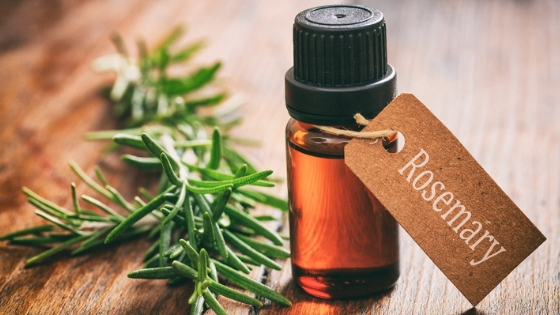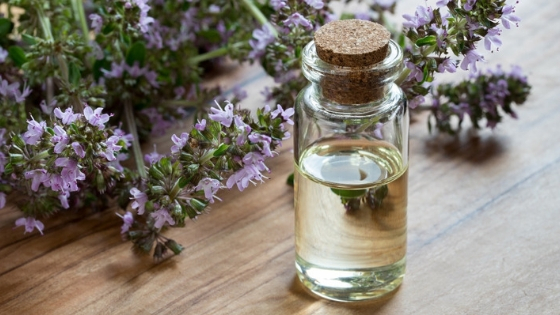If you want to fortify your body against viruses and bacteria that invade, attack, and cause a host of unpleasant and inconvenient symptoms, then you might consider essential oils as a way to boost your immunity this cold and flu season.
Remember that essential oils come from plants – often herbs, flowers, seeds, stems and bark. Some plants are better than others at warding off bacteria, viruses, fungi, and other pathogens. Let’s use companion gardening to put this into perspective and fully understand it.
Organic gardeners know that certain, strongly scented herbs and flowers actually repel bugs and disease. For example, planting basil next to your tomatoes may help strengthen the plants and ward off invaders. Other companion herbs that protect plants against diseases and pests include rosemary, sage, thyme, and oregano.
Sure, enough, many of the same plants that afford gardeners chemical-free protection of their growing vegetables also offer protection to humans by arming their immune systems against viruses and bacteria. Rosemary oil, thyme oil, and oregano oil are among the most powerful, illness-fighting, immune-boosting essential oils you can find.
Because these essential oils are so strong, you will likely have to adjust the ratio if you are preparing EO blends using these powerful germ fighters and illness busters. It only takes a few drops of the strongest-smelling oils.
Sage oil, while it is available for purchase, may be risky in personal applications as it is known to be toxic to the body. You can safely use clary sage oil in your diffuser as well as massage it into the skin.
Here are two very powerful oils:
Rosemary Oil as an Immune Booster
Rosemary oil is analgesic, antibacterial, anticancer, anticatarrhal, antifungal, anti-inflammatory, antioxidant, and expectorant in nature.
In addition to fighting cold and flu viruses, rosemary oil will reduce inflammation in the body. Chronic inflammation is the immune system over-reacting, which slowly wears down the body’s ability to fight infections such as cold and flu germs when they become present. So if you reduce inflammation, you can help your body regain immune response and arm yourself against cold and flu.
An expectorant helps the body expel mucus, which helps get rid of colds faster. Rosemary oil can, therefore, help you get over a cold more quickly if used as a method of cold relief.
According to Valerie Ann Worwood, the author of The Complete Book of Essential Oils and Aromatherapy, a blend of rosemary, lemon and eucalyptus oils can be massaged into the facial sinus areas. This includes the bridge of the nose, cheekbones, temples to relieve sinus congestion and speed healing from a cold virus.
Rosemary Oil Diffuser Blend Immune Boosting Recipe
Here’s a great smelling diffuser blend that will help you fight cold and flu germs using rosemary and other essential oils. Here, invigorating rosemary is balanced by grounding cinnamon and soothing and clarifying lemon.
- 3 drops rosemary oil
- 3 drops lemon oil
- 3 drops cinnamon oil
Rosemary Oil Foot Rub to Fight Cold and Flu
Mix the following blend with about half a cup of carrier oil and rubbed into the feet at bedtime to prevent or speed up recovery from cold and flu. You can also add mineral salts to this mix to make a scrub that will remove dead skin cells from the feet so that the oils will soak into the skin more deeply.
- 6 drops rosemary oil
- 6 drops lavender oil
- 4 drops tea tree oil
It’s best to store your essential oil blends in a dark colored container with a tight-fitting lid to prevent the oils from evaporating and losing their effectiveness. You can purchase special jars and bottles for this purpose on Amazon.com.
Thyme Oil as an Immune Booster
Thyme oil is possibly the most powerful of the essential oils known to fight germs. In fact, the ingredient “Thymol” which appears in environmentally friendly cleaning products is a chemical derivative of thyme oil.
Thyme oil is known to be antispasmodic, antirheumatic, antiseptic, bactericidal, bechic, cardiac, carminative, cicatrisant, diuretic, emenagogue, expectorant, hypertensive, insecticide, stimulant, tonic, and vermifuge.
This article lists the top benefits of thyme essential oil.
The first clue of thyme oil’s great healing and cleansing abilities is its strong, unpleasant odor. When you pop open your bottle of thyme essential oil, you will most likely cringe and recoil in horror. In fact, the oil is so potent that it almost resembles motor oil. You may be hit with its noxious fumes before it’s even out of the box.
Thyme Oil Foot Rub – “Immune Assist” Blend
If you feel a cold coming on, one of the best ways to fight it is to mix up a blend of thyme and a few different calming oils, add a carrier oil, and massage into freshly scrubbed feet before retiring for the evening. Even better if you can exfoliate the feet to allow for deeper penetration of the healing oils into the skin.
- 3 drops thyme oil
- 6 drops lavender oil
- 6 drops geranium oil
- Half a cup carrier oil such as olive or jojoba
Thyme Oil “Cold and Flu” Diffuser Blend
While you’re busy mixing up healing potions, you may as well take out your essential oil mister for some aromatherapy cold and flu prevention or cure in the night. To your diffuser, add:
- 4 drops lavender
- 4 drops thyme oil
- 4 drops German chamomile oil
This is a soothing and relaxing blend that will make you drowsy after breathing it for a few moments. The lavender and chamomile contain sedative properties. This is beneficial because it counters the stimulating effects of the thyme oil. This is exactly what your immune system ordered for natural healing in your sleep.


